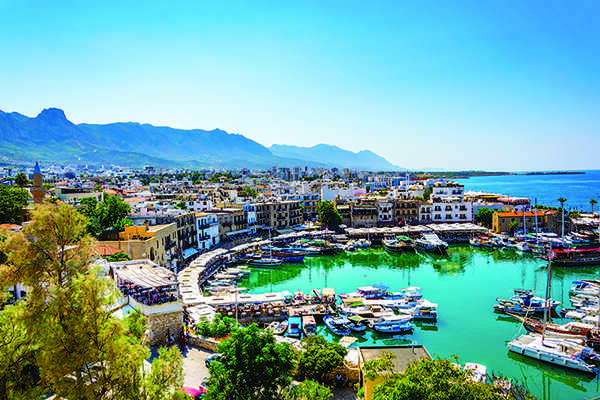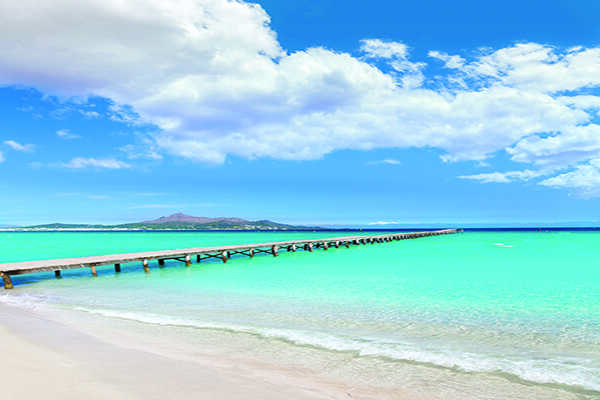Azure waters lapping the shore, palm trees swaying in a breeze, your toes in the warmth of a sandy beach. Nothing beats island life. Pair that with picturesque medieval towns, some of the best cuisine in the world, and surprising affordability, and you have a recipe for a dream overseas home.
There are plenty of islands in Europe where you get warm weather for much of the year, attractive coastlines, and a range of amenities like water sports, seaside restaurants, and other fun in the sun.
You can head to charming seaside villages where life remains much as it has for centuries…or full-service resorts packed with vacationers. Islands used to be isolated. But in these days of fast and affordable travel (many islands have international airports with an impressive array of destinations) and high-speed internet, you can enjoy the best of island life while staying connected to the rest of the world.
Plus, you have all the modern conveniences to make for comfortable long-term living.
Esentepe, Cyprus
Two-bedroom duplex in a seaside village for €100,000 ($117,356)

©Trabantos/iStock
Like many Mediterranean islands, Cyprus has become a favorite haunt of northern European vacationers. Its shores are dotted with busy resort towns packed with sunburned tourists. Perfectly fine for some. But if you seek peace and quiet, you might try the seaside village of Esentepe on the northern coast of the island.
You can hike among olive groves in the surrounding foothills of the Kyrenia mountain ranges, and maybe even stumble across the ruins of a long-abandoned monastery. On the beach, it’s common to see turtles come ashore to lay eggs—an indication of just how laidback this stretch of coast is. At the same beach, the outgoing tide leaves behind rock pools filled with seawater—natural hot tubs when they’re warmed by the sun.
The Byzantine-era village is surrounded by modern development on the outskirts, which is where most second-home owners live. Here you can find a fully furnished, two-bedroom home—part of a duplex—with a community pool and lush garden area. You can walk to the beach. All at an affordable $117,356.
Termini Imerese, Sicily
Renovated four-bedroom villa with sea views for €190,000 ($222,976)

©CJ_Romas/iStock
A crossroads of the Mediterranean for thousands of years, Sicily is the largest island and one of the most densely populated in this sea. It retains a distinct character from mainland Italy that expresses itself in its culture and cuisine.
Just east of Palermo, Sicily’s capital, Termini Imerese, has been famed since Roman times for its natural volcanic hot mineral springs and thermal waters. They’re said to cure respiratory, dermatological, and other ailments.
This renovated villa is actually made up of an upstairs and downstairs unit, which means you could live in both or live in one and rent out the other. Each has two bedrooms and is totally self-contained. The hillside location offers cooling breezes and views over the surrounding countryside and distant Mediterranean from the home and expansive terrace.
Mallorca, Balearic Islands, Spain
Renovated four-bedroom village house for (€199,000) $233,538

Mallorca, the largest of the five inhabited Balearic Islands at 637 square miles, is a hugely popular vacation destination among Europeans, thanks to abundant beautiful beaches, active nightlife, and other benefits. In fact, the Palma de Mallorca international airport is one of the busiest in Spain, with nearly 30 million passengers each year.
But this autonomous Spanish region just off the coast in the Mediterranean, where Catalan, along with Spanish, is an official language, has also played a major role in European history. Multiple kingdoms and empires have fought over it, as evidenced by plentiful Roman ruins, hilltop castles in the mountainous countryside, and Arab structures built before the Reconquest.
In the town of Muro, on the north coast, is a renovated three-story, four-bedroom village home just seven minutes’ drive to the quiet beach. Courtyards, terraces, and balconies let you enjoy the warm weather. A third-floor library/living room could be converted into another large bedroom.
Note: Unless I say otherwise, I haven’t seen the properties mentioned above in person nor have I conducted any due diligence. As always, it’s critical you do your own due diligence on any real estate.
Your Real Estate Questions Answered
Dora says: Hi Ronan. You mention in some of your articles that one should “do your own due diligence.” What exactly would this consist of?
Ronan Responds: Hi Dora. When buying a property anywhere, home or abroad, you need to make sure that all the right legal work is in place, that you have full rights to ownership, and that there will be no nasty surprises down the line.
When you’re buying something as valuable as a home, you want to make sure of what you’re paying for. That’s the purpose of your due diligence. It’s insurance against the unexpected.
The good news is, you’re not doing it alone. Your attorney will help you with the process. My suggestion is to hire a good, local, in-country attorney. Your U.S. or Canada-based attorney may work wonders for you…but they’re not likely to be familiar with the intricacies of buying a property in your chosen country.
Your attorney should be bilingual and work only for you. They should not represent anyone else in the transaction. That may sound like a given, but in many countries, an attorney can legally represent both sides in a transaction.
If you are unsure about how to find a good local attorney, do what you would do back home. Ask friends, family, or colleagues if they have bought property in that country, and if so, which attorney they used. Failing that, First American Title Insurance has a list of approved attorneys they work with in foreign countries. You can ask for their list of approved attorneys in Costa Rica, for example.
Your attorney will help you with the sales contract, check the title deed in the registry, and make sure that your seller/developer has all the permits and approvals they need to comply with current regulations.
In some locations, like Nicaragua, you should consider title insurance. Title insurance is available in some countries overseas and it’s affordable. It covers defects in title, property taxes, boundary disputes, hidden defects—up to the point when you buy the property. Basically, it gives you peace of mind. If someone challenges your title, then the title company should defend that title. They either cover your defense costs, or they pay you your actual loss if they made a mistake, up to the amount of the policy.
When it comes to the sales contract, if it’s in a foreign language, have your attorney translate it for you and read it yourself. Ask your attorney to explain any clauses or terms that you are not sure of.
I’d also suggest doing a thorough check of the site of the property itself. You need to make sure that the property has clear access, and there are not any issues with right-of-way (your attorney can check this).
Also, make sure all the infrastructure is in place. Ask the seller as many questions as you need to ask to feel comfortable before proceeding with the sale.
For instance, check the situation with the water. Is there potable water, good pressure, mains supply? Is the electric in place? If not, what timeframe are you looking at? And will it be aboveground or underground? What’s the situation with the roads? Are they paved or unpaved?
And if high-speed internet is an absolute necessity for your job or your business, check that it is available in your area (preferably with a service provider).
To sum up, I get that there are hardly two words in the English language as boring as “due diligence.” Together, they have the effect of sucking all the romance out of your overseas adventure. However, in my experience, once you have a good attorney on board, it’s all very straightforward, and relatively hands-off. Getting it done at the beginning means you’ll enjoy your overseas home with full peace of mind once you’ve finally moved in.
 Editor’s Note: You can email Ronan with your questions and comments at feedback@realestatetrendalert.com. Please note that we may publish your question along with Ronan’s reply, in his Your Overseas Dream Home e-letter or right here in IL magazine. If we do so, we will not use your full name or your email address. If you wish us to use a pseudonym, please state this clearly in your feedback email. All manner of feedback is welcome. Ronan will respond to as many emails as possible. (Ronan McMahon is the editor of Real Estate Trend Alert and a contributing editor to IL.)
Editor’s Note: You can email Ronan with your questions and comments at feedback@realestatetrendalert.com. Please note that we may publish your question along with Ronan’s reply, in his Your Overseas Dream Home e-letter or right here in IL magazine. If we do so, we will not use your full name or your email address. If you wish us to use a pseudonym, please state this clearly in your feedback email. All manner of feedback is welcome. Ronan will respond to as many emails as possible. (Ronan McMahon is the editor of Real Estate Trend Alert and a contributing editor to IL.)

